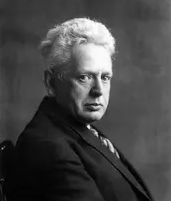Ernst Cassirer(1874–1945): THE PHILOSOPHY OF SYMBOLIC FORMS,
Volume 2: Mythical Thinking
MYTH AS FORM OF INTUITION ,
The Construction and Organization of the Spatiotemporal World in Mythical Consciousness,
4. THE CONFIGURATION OF TIME IN MYTHICAL AND RELIGIOUS CONSCIOUSNESS, pp.154-159

然而,在巴門尼德(Parmenides)那裡,希臘思想在時間問題上採取了全新的立場。他的偉大成就是,他的思維第一次使邏各斯(logos)成為存在的尺度,從中可以期待關於存在與非存在的最終決定,kpíois [批判]。對他來說,時間和生成的力量消失成海市蜃樓。只有神話才有時間起源,存在的「起源」──而對於邏各斯本身,起源問題就失去了意義。 ……
In Parmenides, however, Greek thinking took an entirely new position in regard to the problem of time. It is his great achievement that with him for the first time thinking made logos the measure of being, from which the final decision, the kpíois [critique], concerning being and nonbeing is expected. And for him, the power of time and becoming dissolves into a mere mirage. Only for myth is there a temporal origin, a "genesis" of being - whereas for logos itself the very question of an origin loses its sense. .....
改變的世界不該被否認,而是應該被「拯救」。然而,只有為感性現象的世界提供堅實的智力基礎,這種拯救才能實現。正是為了滿足這個要求,德謨克利特(Democritus)理解了原子世界,柏拉圖(Plato)理解了理念世界。對於時間的生成和滅去,一方面反對支配所有物理事件的不變的自然法則的一致存在,另一方面反對所有時間存在都參與其中的純粹永恆形式的領域。德謨克利特是第一個以真正尖銳和普遍的形式闡述自然法概念的人,並憑藉由此建立的新標準來貶低所有神話思維,認為它們僅僅是主觀的和擬人化的:「人們塑造了一個偶然的海市蜃樓,作為他們自己的愚蠢的藉口。」對於這個人類偶像,他反對邏各斯的永恆必然性,它不知道任何偶然性,也不例外於世界事件的普遍規則:一切的發生都是出於理性和必然]
The world of alteration was not to be denied but rather "saved"; however, this salvation could be achieved only if a solid intellectual substratum could be provided for the world of sensible phenomena. It was in answer to this demand that Democritus comprehended the world of atoms and Plato the world of Ideas. To the temporal coming-into-being and ceasing-to-be, the one side opposed the consistent existence of immutable natural laws that govern all physical events, while the other side opposed a realm of pure timeless forms in which all temporal existence participates. Democritus was the first to state the concept of natural law in a truly sharp and universal form and by virtue of the new standard thus established to disparage all mythical thinking as merely subjective and anthropomorphic: "People have fashioned a mirage of Chance as an excuse for their own stupidity." ' To this human idol, he opposed the eternal necessity of logos, which knows no chance, no exception to the universal rule of the world events: [Nothing happens at random; everything happens out of reason and by necessity]
